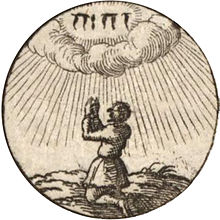Intercession of saints
In ecclesiastical usage both words are taken in the sense of the intervention primarily of Christ, and secondarily of the Blessed Virgin and the angels and saints, on behalf of men.
Some interpret 2 Timothy 1:16–18 to support prayer for the dead: "The Lord give mercy unto the house of Onesiphorus; for he oft refreshed me, and was not ashamed of my chain: But, when he was in Rome, he sought me out very diligently, and found me.
"[9] Thomas Aquinas quotes Revelation 8:4: "And the smoke of the incense of the prayers of the saints ascended up before God from the hand of the angel.
"And Onias spoke, saying, 'This is a man who loves the brethren and prays much for the people and the holy city, Jeremiah, the prophet of God.
[13] Gregory of Nazianzus said of his deceased father: "I am well assured that his intercession is of more avail now than was his instruction in former days, since he is closer to God, now that he has shaken off his bodily fetters, and freed his mind from the clay which obscured it";[14] and Jerome wrote: "If the Apostles and Martyrs, while still in the body, can pray for others, at a time when they must still be anxious for themselves, how much more after their crowns, victories, and triumphs are won!
"[10] The doctrine of intercession and invocation was set forth by the Council of Trent, which teaches that "... the saints who reign together with Christ offer up their own prayers to God for men.
It is good and useful suppliantly to invoke them, and to have recourse to their prayers, aid, and help for obtaining benefits from God, through His Son Jesus Christ our Lord, Who alone is our Redeemer and Saviour".
[16] In ecumenical conversations, agreement has been reached that "asking the saints to intercede for us expresses the solidarity of the church wherein all are meant to be of mutual support to one another.
Analogous to what is done among living persons, the request directed toward a saint to pray for us is a precise expression of solidarity in Jesus Christ, through the ages and across various modes of human existence".
[20][21][22] Although the Augsburg Confession rejects invoking the saints to ask for their help, it affirms that "they pray for the Church universal in general" in life and in heaven.
[34] Specifically, John Calvin in the Institutes of the Christian Religion ([35]), believes that the Bible demonstrates that the central principle of worship is on the direct invocation of God.
Calvin teaches that in Hebrews 13:15, Christians are reminded that "without the intervention of his priesthood our lips are not pure enough to celebrate the name of God".
In contrast, Calvin believes that the practice of praying to saints is a demonstration of "distrust, because they are either not contented with Christ as an intercessor or have altogether robbed him of this honour".
In ancient Judaism, it was also popular to pray for intercession from Michael in spite of the rabbinical prohibition against appealing to angels as intermediaries between God and his people.
There were two prayers written beseeching him as the prince of mercy to intercede in favor of Israel: one composed by Eliezer ha-Kalir, and the other by Judah ben Samuel he-Hasid.
[citation needed] In modern times, one of the greatest divisions in Jewish theology (hashkafa) is over the issue of whether one can beseech the help of a tzadik – an extremely righteous individual.
It strongest opposition is found largely among sectors of Modern Orthodox Judaism, Dor Daim and Talmide haRambam, and among aspects of the Litvish Chareidi community.
Those who oppose this practice usually do so over the problem of idolatry, as Jewish Law strictly prohibits making use of a mediator (melitz) or agent (sarsur) between oneself and the Almighty.
[citation needed] The perspectives of those Jewish groups opposed to the use of intercessors is usually softer in regard to beseeching the Almighty alone merely in the "merit" (tzechut) of a tzadik.


